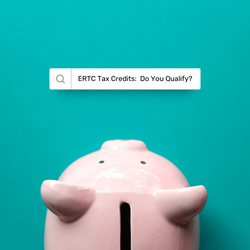
As the owner of a business consulting firm, I’ve had the opportunity to work with many small business owners over the years. And one thing that continually surprises me is how many of them are leaving money on the table when it comes to the Employee Retention Tax Credit (ERTC). This valuable tax credit was designed to help businesses keep employees on their payroll during the COVID-19 pandemic. However, despite being a lifeline for struggling businesses, many entrepreneurs are unaware that it exists or don’t understand how it works.
The ERTC was first introduced in March 2020 as part of the CARES Act, and it has been extended and expanded several times since then. It’s available to businesses of all sizes that experienced a significant decline in revenue or were forced to shut down due to the pandemic. And the best part? It’s a refundable tax credit, meaning businesses can receive money back even if they don’t owe any taxes.
There are several benefits to the ERTC for businesses that qualify:
1. Financial assistance: The ERTC provides a tax credit for a portion of the wages paid to employees, which can help businesses offset some of the financial strain caused by the pandemic.
2. Flexibility: The ERTC is available to businesses of all sizes, including sole proprietorships, partnerships, and corporations. It can also be claimed by tax-exempt organizations.
3. Simplicity: The ERTC is relatively easy to claim, as it can be claimed on the business’s tax return and is based on the wages paid to employees.
To qualify for the ERTC, a business must have experienced a significant decline in revenue as a result of the COVID-19 pandemic. The exact amount of the credit depends on the amount of wages paid to employees and the decline in revenue experienced by the business. If you are a business owner who was impacted by the COVID-19 pandemic and had W-2 employees, you may be eligible for the ERTC even now. It is worth considering whether your business qualifies and how you can take advantage of this tax credit to help your business through these difficult times.
The best part: this is not a loan and therefore never has to be paid back.
And most business owners think their own accountants will help them apply but it’s just not true. Why?
Here are a few reasons why most accountants may not want to deal with applying for the Employee Retention Tax Credit (ERTC) for their clients:
1. Complexity: The ERTC program has many rules and requirements, and it can be difficult for accountants to understand and navigate all of the different eligibility criteria. This can make it time-consuming and challenging for accountants to determine whether a client qualifies for the credit and how to properly claim it.
2. Lack of guidance: There is a lack of clear guidance and resources available to accountants on how to properly claim the ERTC. This can make it difficult for accountants to feel confident in their ability to accurately and properly claim the credit for their clients.
3. Risk of errors: If an accountant makes a mistake in claiming the ERTC, it could lead to problems with the IRS and potentially result in the credit being denied or the business owing additional taxes. This risk of errors may discourage some accountants from attempting to claim the credit for their clients.
4. Limited expertise: Some accountants may not have a strong understanding of the ERTC program or may not have experience with claiming credits for their clients. This may lead them to feel uncertain or unprepared to take on the task of claiming the credit.
But there is hope for you if your accountant doesn’t want to take any chances with getting you your money back!
Their 15 Minute Refund program is available from a firm of CPAs and is guaranteed to provide each employer with their maximum allowable rebate. The firm has helped over 4000+ businesses recover their ERTC earnings. The CPA team also provides audit-proof documentation for IRS support. This program is open to startups, new businesses, non-profit organizations, and small to medium-sized businesses with up to 500 full-time employees.
Employers who kept staff on the payroll throughout the pandemic can claim up to $26,000 per employee in tax credits. Funding is available to companies regardless of if they have already received PPP loans. Unlike the Paycheck Protection Program, ERTC rebates are not loans. They never need to be repaid, and there are no restrictions on how they can be spent.
The fast rebate service is available with no risk. Any employer who does not qualify for and receive a rebate will not be charged, and there is no upfront cost.
Start-up businesses have a special qualification option for the ERTC rebate program but can apply too.
To see if you qualify, employers can take a no-cost, no-obligation eligibility assessment on the “My Business Recovery Refund” website. The assessment can be completed in approximately one minute and does not require any proprietary business information.
The 15 Minute Refund program has helped employers to claim rebates ranging from a few thousand dollars to more than $2 million.
For more information about the no-obligation eligibility assessment, or to begin the 15 Minute Refund program, you can visit https://mybusinessrecoveryrefund.com














